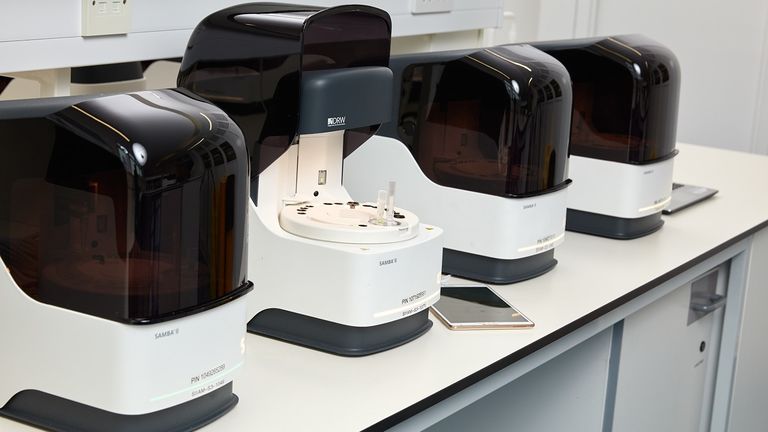Coronavirus: At-home immunity tests will take ‘at least a month’, professor says
It will take “at least a month” to develop a reliable at-home antibody test kit for COVID-19 that can be widely used, the Regius Professor of Medicine at Oxford University has said.
Despite this warning, Sir John Bell believes “the UK is now uniquely positioned to evaluate and find the optimal test for this disease”.
He has written an open letter in which he explains the challenges around testing for detecting if a person has developed immunity against COVID-19 and explores how these antibody tests have not been accurate enough so far.
The UK government has been creating a strategy to carry out, among others, blood tests to identify people who may have had the virus and are now protected having developed an immunity.
There has been success in developing a diagnosis test that delivers results in 90 minutes, but at-home antibody tests have proven harder.
Those who have developed an immunity could go back into society, including for work, as they do not risk getting the virus again.
He explains: “Long-term protection to this virus comes from antibodies, small proteins produced by your immune system that attack the virus and neutralise it so it cannot be spread and cannot do any more damage to the person infected.”
“It may be that many people get this infection without severe symptoms so many may have protection and not know it,” he adds, commenting that large scale testing is “crucial for getting us back to our normal lives in the coming months”.
Acknowledging the benefits of these tests, Sir John cautions that tests that are not accurate can cause problems, noting that Spain has been forced to send tests back because they did not work.
He writes: “There are many challenges to creating accurate tests; hence these tests need to be validated carefully. Other countries such as Spain have already sent tests back because they don’t work.
“There are 100 or more such tests kits from different suppliers available for identifying COVID-19 antibodies, and it is important that each of these is checked for accuracy before making them available to the public.”
Sir John warns that if tests give incorrect answers, some might believe they are protected by immunity when they are not.
To create what Sir John describes as a “gold standard test”, he outlines that swabs are needed from coronavirus patients who recovered from the virus infection approximately 28 days before, as well as blood from people who donated before the epidemic in order to identify any false positive tests.
He writes that the UK is in a good position to find a reliable test, but despite looking at many options “sadly, the tests we have looked at to date have not performed well”, but adds that “no test has been acclaimed by health authorities as having the necessary characteristics for screening people accurately for protective immunity.”
Sir John, who is also a government adviser on Life Sciences, concludes saying an at-home antibody test is a real possibility but will still take time.
He writes: “That should be achievable, and the government will be working with suppliers both new and old to try and deliver this result so we can scale up antibody testing for the British public.
“This will take at least a month.”
One of the first new-style antibody tests for the coronavirus began validation trials to prove its reliable enough for widespread use at the end of March, with scientists at the Liverpool School of Tropical Medicine using it against samples taken from doctors and nurses on the frontline of the pandemic.
The 10-minute test – made by Mologic – requires just a small finger-prick of blood.
Source: Read Full Article



